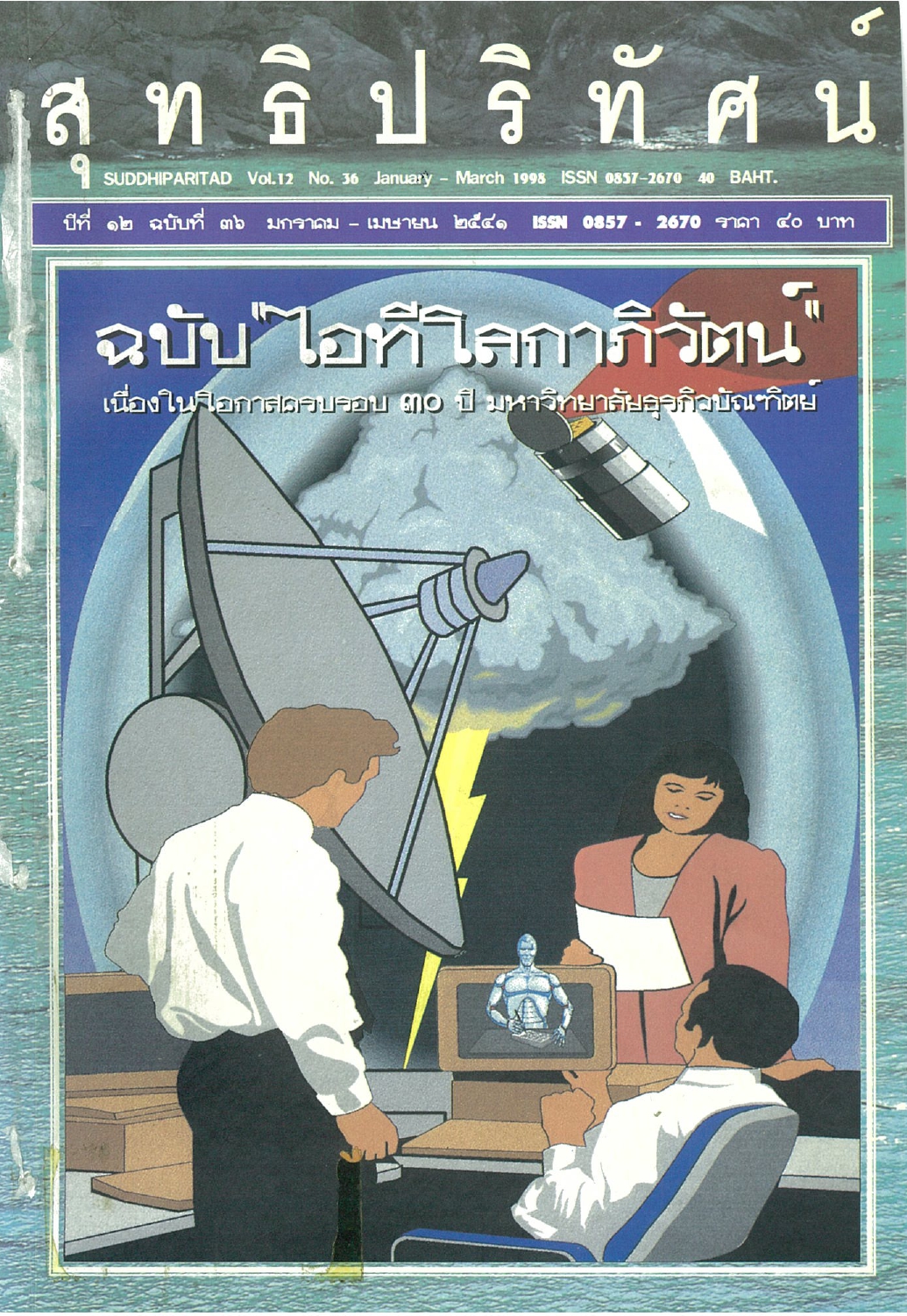การบริหารข้ามวัฒนธรรมและการบริหารเชิงเปรียบเทียบ : แง่มุมหนึ่งของการวิพากษ์
บทคัดย่อ
ข้อความบทคัดย่อไม่สมบูรณ์ กรุณาดูฉบับพิมพ์
เอกสารอ้างอิง
Adler, N.J. (1983). A Typology of Management Studies Involving Culture, Journal of International Business Studies, 14 (2), 29-48.
Barrett, G.V., & Bass, B.M. (1970). Comparative Surveys of Managerial Attitudes and Behavior. In J. Boddewyn (Eds.), Comparative Management : Teaching, Research, and Training, (pp. 179-207). New York : New York University Graduate School of Business Administration.
Child, J. (1981). Culture, Contingency and Capitalism in the Cross National Study of Organizations, In L.L. Cummings & B.M. Staw (Eds.). Research in Organizational Behavior, Vol. 3, pp. 303-356, Greenwich, CT: JAI Press.
Davis, S.M. (1971). Comparative Management: Cultural and Organizational Perspectives. Englewood Cliffs, NJ: Prentice-Hall.
Doktor R.H. (1990). Asian and American CEOs: A Comparative Study. Organizational Dynamic, 18(3), 49.
Duncan, R.B. (1972). Characteristics of Organizational Environments and Perceived Environmental Uncertainty. Administrative Science Quarterly, (17). 313-327.
Estafen, B.D. (1970). System Transfer Characteristics: An Empirical Model for Comparative Management Research. Management International Review, 10 (2), 21-34.
Farmer, R.N., & Richman, B.M. (1965). Comparative Management and Economic Progress. Homewood, IL: Irwin.
Haire, M., Ghiselli, E.E., & Porter, L.W. (1966). Managerial Thinking: An International Study. New York: Wiley.
Hampden-Turner C. & Trompenaars F. (1993). The Seven Cultures of Capitalism: Value Systems for Creating Wealth in the United States, Britain, Japan, Germany, France, Sweden, and the Netherlands. New York: Doubleday.
Harbison, F., & Myers, C.A. (1959). Management in the Industrial World: An International Analysis. New York: McGraw-Hill.
Hesseling, P. (1973). Studies in Cross-Cultural Organization. Columbia Journal of World Business, 8 (December), 120-134.
Hodgetts, R.M., & Luthans, F. (1993). U.S. Multinaltionals' Compensation Strategies for Local Management: Cross-Cultural Implications. Compensation and Benefits Review, March-April, 42-48.
Hofstede, G. (1980). Culture's Consequences : International Differences in Work Related Values. Beverly Hills, CA : Sage.
Hofstede, G. (1984). The Cultural Relativity of the Quality of Life Concept. The Academy of Management Review, 9, 389-398.
Janssens, M., Brett, J.M., & Smith, F.J. (1995). Confirmatory Cross-Cultural Research : Testing the Viability of a Corporation-Wide Safety Policy. The Academy of Management Journal, July, 364-382.
Kelley, L., & Worthley, R. (1981). The Role of Culture in Comparative Management: A Cross-Cultural Perspective. The Academy of Management Journal. 24 (2), 64-173.
Lawrence, P.R., & Lorsch, J.W. (1967). Organization and Environment: Managing Differentiation and Integration. Homewood, IL: Irwin.
Nath, R. (1975). Comparative Management and Organization Theory: Linking the Two Organization and Administrative Science, 5 (4), 115-124.
Nath, R. (1986). Role of Culture in Cross-Cultural and Organizational Research. In R. Farmer (Ed.), Advances in International Comparative Management. Vol. 2. (pp. 249-267). Greenwich, CT: JAI Press.
Nath, R. (1988). Comparative Management: A Regional View. Cambridge, MA.: Ballinger.
Negandhi, A. R. (1973). Comparative Management and an Open Systems Theory. A Position Paper Presented at the Academy of Management Meeting, Boston, MA.
Negandhi, A. R., (1975). Comparative Management and Organization Theory: A Marriage Needed. The Academy of Management Journal, 18 (2), 334-344.
Negandhi, A. R. (1983). Cross-Cultural Management Research: Trend and Future Directions. Journal of International Business Studies, 14 (2), 17-28.
Negandhi, A. R., & Prasad, S. B. (1971). Comparative Management. New York : Appleton-Century-Crofts.
Negandhi, A. R., & Prasad, S. B. (1975). The Frightening Angels: A Study of U.S. Multinationals in Developing countries. Kent, OH: Kent State University Press.
Peterson, R.B. (1986). Future Directions in Comparative Management Research : Where We Have Been and Where We Should Be Going. International Management Newsletter, 3, 5-10.
Porter, M.E. (1980). Competitive Strategy: Techniques for Analyzing Industries and Competitors. New York: Free Press.
Ralston, D.A., Holt, D.H., Terpstra, R.H., & YC Kai-Cheng. (1997). The Impact of National Culture and Economic Ideology on Managerial Work Values: A Study of the United States, Russia, Japan and China. Journal of International Business Studies, 28 (1), 177-207.
Redding G. (1992). The Comparative Management Theory Zoo; Getting the Elephants and Ostriches and even Dinosaurs from the Jungle into the Iron Cages. Paper presented at the Conference-Perspectives on International Business: Theory, Research and Institutional Arrangements, University of South Carolina, May 1992, 5-11.
Roberts, K.H. (1977). On Looking at an Elephant: An Evaluation of Cross-Cultural Research Related to Organizations. In T.D. Weinshall (Ed.), Culture and Management, (pp. 56-104), Middlesex: Penguin Books.
Rodrigues, C.A. (1989). The Situation and National Culture as contingencies for Leader ship Behavior: Two Conceptual Models. Working Paper.
Ryterband, E.C., & Barrett, G.V. (1970). Manager's Values and Their Relationships to the Management of Tasks: A Cross-Culture Comparison. In B.M. Bass, R.C. Cooper, & J.A. Hass (Eds.), Managing for Accomplishment, (pp. 226-260). Lexington, MA.: Lexington Books.
Shackleton V.V. and Newell S. (1991). Management Selection: A Comparative Survey of Methods Used in Top British and French Companies. Journal of Occupational Psychology, 64, 23-26.
Schollhammer, H. (1969). The Comparative Management Theory Jungle. The Academy of Management Journal, 12, 81-97.
Schollhammer, H. (1970). Strategies in Comparative Management Theorizing. In J. Boddewyn (Ed.), Comparative Management Teaching, Training and Research. NY: New York University.
Sekaran, U. (1981). Methodological and Theoretical Issues and Advancements in Cross-Cultural Research. Paper presented at the McGill International Symposium on Cross-Cultural Management. Montreal, Canada.
Smith, P.B., Peterson, M.F., & Mismumi, J. (1994). Event Management and Work Team Effectiverness in Japan, Britain and the USA. Journal of Occupational and Organizational Psychology, 67. 33-34.
Tayeb, M.H. (1988). Organization and National Culture. Beverly Hills, CA: Sage.
Thiagarajan, K.M. (1968). A Cross-Cultural Study of the Relationships between Personal Values and Managerial Behavior. Technical Report 23, NONR NOO14-67A. Rochester, N.Y.: University of Rochester, Management Research Center.
Trompenaars F. (1993). Riding the Waves of Culture. London: The Economist Books.
Tung, R.L. (1979). Dimensions of Organizational Environments: An Exploratory Study of Their Impact on Organization Structure. The Academy of Management Journal, 22, 672-693.
Tung, R.L. (1986). Toward a Systems Model of Comparative Management. In R. N. Farmer (Ed.), Advances in International Comparative Management, Vol. 2, (pp. 233-247). Greenwich, CT: JAI Press.
Weick, K.E. (1969). The Social Psychology of Organizing. Reading, MA: Addison-Wesley.
ดาวน์โหลด
เผยแพร่แล้ว
รูปแบบการอ้างอิง
ฉบับ
ประเภทบทความ
สัญญาอนุญาต
เนื้อหาและข้อมูลในบทความที่ลงตีพิมพ์ในวารสารสุทธิปริทัศน์ ถือเป็นข้อคิดเห็นและความรับผิดชอบของผู้เขียนบทความโดยตรงซึ่งกองบรรณาธิการวารสาร ไม่จำเป็นต้องเห็นด้วย หรือร่วมรับผิดชอบใด ๆ
บทความ ข้อมูล เนื้อหา รูปภาพ ฯลฯ ที่ได้รับการตีพิมพ์ในวารสารสุทธิปริทัศน์ ถือเป็นลิขสิทธิ์ของวารสารสุทธิปริทัศน์หากบุคคลหรือหน่วยงานใดต้องการนำทั้งหมดหรือส่วนหนึ่งส่วนใดไปเผยแพร่ต่อหรือเพื่อกระทำการใด ๆ จะต้องได้รับอนุญาตเป็นลายลักษณ์อักษรจากวารสารสุทธิปริทัศน์ก่อนเท่านั้น







